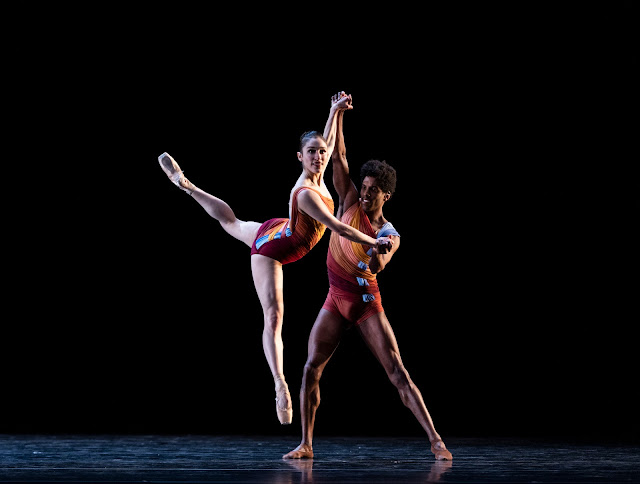Pacific Northwest Ballet Gives Us a Wonderful Gift on Their 50th Birthday!
Pacific Northwest Ballet principal dancers Leta Biasucci and Jonathan Batista in the stage premiere of Edwaard Liang’s The Veil Between Worlds, which PNB is presenting on a triple-bill with new works by Annabelle Lopez Ochoa and Kiyon Ross, running June 2 – 11, 2023, as the culmination of its 50th Anniversary season. (Streaming digitally June 15 – 19.) Photo © Angela Sterling.
PNB has been around for 50 years, which is an accomplishment
to say the least and it got me thinking, just what is it that keeps us coming
back, month after month and year after year.
What is it that makes this artform—perhaps the one form that exists on
the stage that has the greatest number of limitations set upon it, it is silent
for the most part speaking its mysteries through movement and music—what makes
it for me, at least, the most amazing, interesting, and versatile of the dance
forms of today.
Pacific Northwest Ballet’s finale of the season consists of
three contemporary premieres—two having never been seen before and Edwaard Liang’s
production, which premiered online during PNB’s All-Digital 2020-21
season. The night begins with Liang’s “The
Veil between Worlds,” a sprawling athletic set of dances that, despite some
technical issues on opening night is a beautiful tribute to modern dance,
recalling the work of modern dance pioneers like Loie Fuller, Martha Graham and
Isadora Duncan—who believed that dance was a flowing, living tribute to motion.
Liang’s use of a large veil highlights a strong interest in movement, which
underscores not only “Veil,” but also all of the dances in this night’s
program.
That said, the best moments in “Veil” are those wherein it
is just the dancers moving together, especially a most amazing Pas de deux
between Leslie Rausch and James Kirby Rogers, which was beautiful, soulful, and heartbreaking. Speaking of heartbreak—Leslie Rausch will be retiring
after twenty-two years with PNB, and I can’t stop crying about it. Both this and the second pas de deux with
Dylan Wald and Elle Macy were my two favorite moments of the first ballet.
Pacific Northwest Ballet company dancers in the world premiere of Annabelle Lopez Ochoa’s Khepri, which PNB is presenting on a triple-bill with works by Edwaard Liang and Kiyon Ross, running June 2 – 11, 2023, as the culmination of its 50th Anniversary season. (Streaming digitally June 15 – 19.) Photo © Angela Sterling.
Recently, I was at an interim board meeting for the resuscitated
Center on Contemporary Art and the question of just what are the important issues
of the day came up. I very shyly and
with almost too many caveats put forward the assertion that identity, with all
its complexities and complications, and especially representation, for
all of us, straight, LGBTQ+, POC, goth or otherwise is a very important element
of what drives us all today. That is why
it is so important for things such as the Pride Parade, which not only
celebrates LGBTQ+ identity as a whole; but gives us many of the various
individual and complex groups within its multivocal rubric! I am, in fact, proud to take a moment to say
that I will be joining the parade as MX. Gothic Pride Seattle, just one of the
various identities that I wield in this life.
I look forward to standing and walking in the parade representing Latino/X,
Nonbinary, Goth, writers, artists, performance artists in this year’s parade. I
mention this because PNB has always been a wonderful bastion of inclusivity,
Ballet—of course, too has a very long history of being one of the most
inclusive artforms and PNB’s Directors, Principals, Soloists and the Corps de
Ballet are a testament to diversity of nearly every kind. That said, I was especially proud and excited
to see a choreographer with the name Lopez.
It made me feel seen, even represented—so to speak.
“Khepri” the second ballet is named after “an Egyptian deity”
and the dance rides a fine line between narrative and abstraction. To be fair, it is difficult now to use bodies
in unison without drawing comparisons to Crystal Pite, but at the same time
influences are a huge part of the language of the arts and no choreographer is
an island.
In addition to drawing inspiration from the Egyptian animal
kingdom “Khepri” seems to be equally about the nature of trust and interaction
between dancers, but also if one extends it to the feelings of love and trust
in any relationship. Throughout the
dance Lopez Ochoa has the dancers fake each other out and make false moves that
if they had not been choreographed would be symbolic of an argument or some
sort of unsafe behavior between the dancers themselves. This actually unnerved me so much that I had
to ask whether I was seeing things or if my imagination was playing tricks on
me. This bit of choreography will, if it
has not already, lead to an entire set of dances in which trust and issues of
trust should play a large part, since trust in choreography is such an important
thing! If one dancer was to actually break
from the unwritten contract of doing exactly what they are supposed to be doing
at any given moment it would be absolutely catastrophic.
Pacific Northwest Ballet’s 50th season is a big
present from start to finish, asking us to look to the future, while very
clearly keeping its feet in the past, even if that step backward is only as far
back as our very recent, collective history. While other reviewers are
celebrating the season ending as groundbreaking. I won’t go quite that far, but
Pacific Northwest Ballet’s final repertory evening of the season, “Worlds to
Come” is a solid, beautiful collection of dances that is a perfect gift from
some amazing choreographers and a solid set of performances by dancers who are
all in their prime—even those who are retiring.
Speaking of gifts, Kiyon Ross’ “…throes of increasing
wonder,” takes that idea and extends the metaphor into an entire ballet. Reminding one of the tasty treats in Alice
in Wonderland, a massive box, using cinematic tricks entreats us to open it
up. “Throes” is easily my favorite set
of dances of the whole night, beautiful, simply, and deftly, it moves from movement
to movement and does what only the best choreography does. It causes you to lose yourself in the whole
of the experience—at least it did for this reviewer and while I won’t give away
the ending and another moment of wonderful cinematic magic. There was a moment that took away my breath
and left me crying like a wee little child. And that, my friends, is the answer
to the question of what keeps us coming back day after day, month after month
and year after year—it is simply this—Magic.
Magic is what keeps us coming back and the hope of more of that magic. Because it does happen, and it connects us to
the hope that is alive in all of us—even if it is just sleeping. Here is to another fifty years of that
special PNB Magic. I hope to come back
to it even as I become old and grey!






Comments
Post a Comment